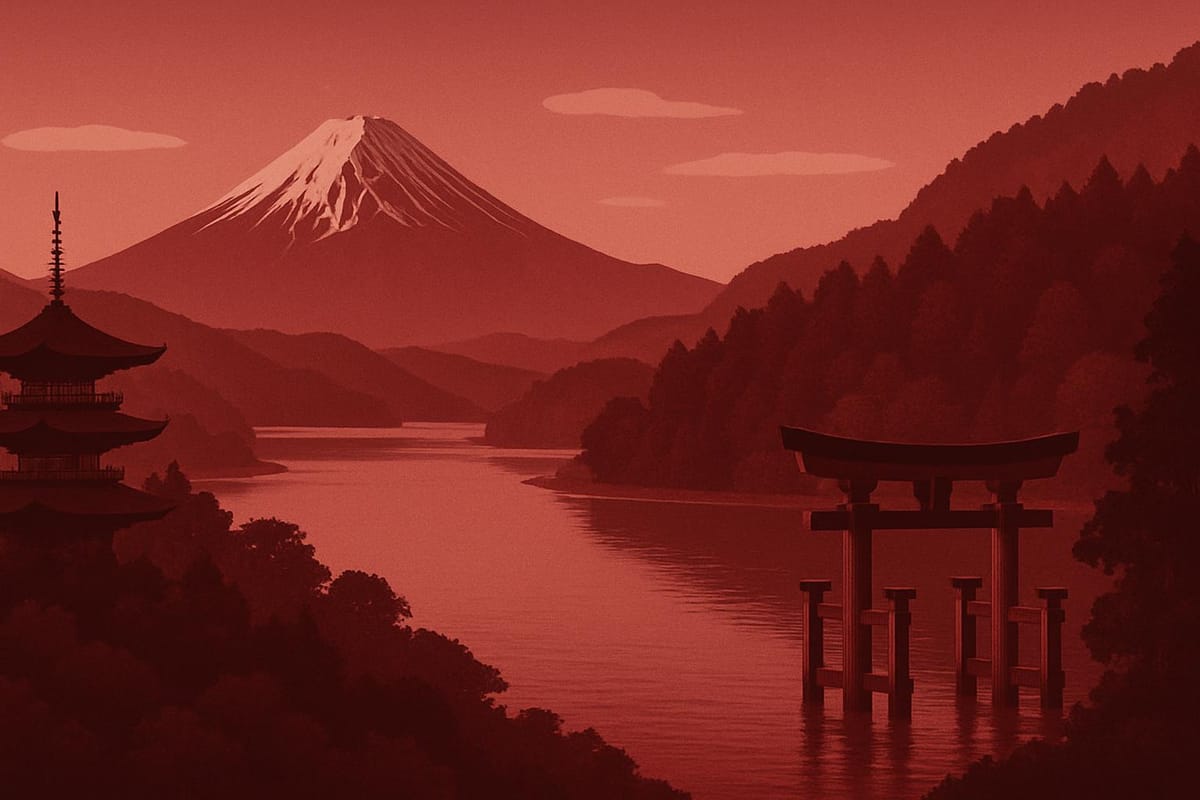Hakone
Hot springs (onsen), Lake Ashi cruises, Mount Fuji views, ryokan stays and art museums.

Important things to know about Hakone
Hakone, in Kanagawa Prefecture of Hakone Japan, is a compact, mountain-framed community where everyday life is shaped by steep slopes, dense woodlands, and a climate marked by seasonal contrasts; residents experience cool summers, crisp autumns, and winter mints of snow that influence building styles, local agriculture, and commuting rhythms. The town’s character blends traditional and contemporary rhythms - small family-run businesses, artisan workshops, and service-sector enterprises coexist with public schools, municipal services, and infrastructure that connects the area to wider Kanagawa and the greater Tokyo region, making accessibility and local mobility important to daily routines. Local culture emphasizes community festivals, culinary traditions rooted in regional produce, and crafts that reflect the landscape’s resources, creating a distinctive identity that inhabitants protect and pass down. Urban planning in Hakone balances preservation of natural corridors and waterways with the needs of modern living, so housing varies from compact mountain homes to low-rise neighborhoods clustered around transport hubs, while public spaces and markets serve as social anchors. The population profile skews toward multi-generational households and a mix of longtime residents with newcomers who value a quieter pace; this social mix informs civic life, volunteer networks, and local initiatives focused on sustainability, disaster resilience, and maintaining infrastructure on rugged terrain. In short, Hakone Japan offers a lifestyle rooted in a mountain environment, local culture, and connectivity to the region, where community resilience and nature-aware living shape daily experience.
Sightseeing hot-spots in Hakone
Hakone is one of Japan’s most beloved day-trip and getaway destinations, offering unforgettable sightseeing experiences within easy reach of Tokyo. Visitors are drawn to the serene waters of Lake Ashi, where classic sightseeing boats and peaceful lakeside walks frame spectacular views of Mount Fuji on clear days. The lakeshore is dotted with cedar trees and the iconic torii gate of Hakone Shrine, a photogenic spot that blends spiritual charm with natural beauty. Scenic drives and mellow hiking trails around the lake allow travelers to soak in both the calm atmosphere and postcard vistas that make Hakone a top choice for nature lovers and photographers.
Adventure and culture meet in the volcanic landscapes and creative spaces around Hakone. The steaming valleys of Owakudani showcase geothermal activity with sulfur vents and hot springs, offering a chance to taste the famous black eggs boiled in volcanic waters. For art enthusiasts, the Hakone Open-Air Museum presents an impressive collection of sculptures set amid rolling gardens and panoramic mountain backdrops, while intimate galleries and craft shops in the area highlight traditional Japanese ceramics and woodwork. The Hakone Ropeway provides a dramatic aerial perspective, connecting visitors from the sulfuric valleys to panoramic ridgelines, making it easy to combine adrenaline and relaxation in one day.
No visit to Hakone is complete without experiencing a traditional Japanese onsen. The region’s hot springs, ryokan inns, and public baths provide restorative relief after a day of sightseeing, with many accommodations offering rooms that face the mountains or lake for a tranquil retreat. Whether your itinerary includes cultural landmarks, outdoor adventure, or the simple pleasure of soaking in mineral-rich waters, Hakone delivers a compact yet diverse travel experience that ranks high on any Japan sightseeing list and repeatedly appears in travel guides as a must-see destination.
Hotels to enjoy in Hakone
Hakone is a top destination for travelers searching for hotels in Hakone that combine scenic beauty with restorative hot springs and traditional hospitality. From boutique ryokan where tatami rooms and futon beds meet modern comforts, to luxury hotels with panoramic Mount Fuji views, the region offers accommodation for every taste. Many visitors choose hotels in Hakone for the unique chance to soak in an onsen while overlooking Lake Ashi or verdant mountain valleys; private outdoor baths and communal rotenburo are signature experiences. Whether you stay near Hakone-Yumoto for easy rail access, in the artsy Gora district, or on the lakefront for sunrise vistas, the variety of options-from contemporary design hotels to centuries-old Japanese inns-ensures a memorable stay that highlights both culture and nature.
When planning a trip, search terms like best hotels in Hakone, Hakone hotel with onsen, or Hakone hotel with Mt. Fuji views can help narrow choices according to priorities such as price, proximity to attractions, or spa amenities. Peak seasons around cherry blossom and autumn foliage can fill rooms early, so early reservations often secure the most sought-after private onsen suites and kaiseki dining experiences. Many hotels in Hakone also offer shuttle access to major transport hubs, on-site spa treatments, and curated excursions on Lake Ashi, making them ideal bases for exploring the Hakone Open-Air Museum, cable car routes, and hiking trails. Combining thoughtful keywords with details about services, views, and local attractions will help travelers find the perfect accommodation and ensure the best Hakone getaway.
Restaurants to try in Hakone
Hakone restaurants offer a memorable blend of traditional Japanese cuisine and scenic dining that draws both domestic and international travelers. Nestled between mountains and lakes, the dining scene ranges from intimate ryokan meals to modern bistros overlooking Lake Ashi and sometimes even Mount Fuji on clear days. Many visitors seek out kaiseki dinners-multi-course seasonal feasts that emphasize local ingredients and artistic presentation-while others prefer the warming experience of an onsen-side meal after soaking in hot springs. The diversity of Hakone dining means you can savor delicate sashimi and grilled fish sourced from nearby waters, seasonal mountain vegetables, and comforting bowls of soba or udon in traditional wooden restaurants, all reflecting the region’s culinary heritage.
Beyond formal dining, Hakone food culture thrives in cozy cafés, street-side stalls, and specialty shops where you can sample regional treats like the famous black eggs boiled in volcanic steam, as well as handmade sweets and artisan sake. Casual restaurants excel at tempura, hearty rice bowls, and creative fusion dishes that reinterpret Japanese flavors for a modern palate. For those optimizing travel plans, exploring a mix of high-end Hakone restaurants and local favorites offers both authenticity and variety, making every meal part of the travel experience. Whether you’re searching for refined Japanese cuisine or relaxed comfort food, Hakone’s culinary landscape promises fresh ingredients, scenic views, and memorable flavors that highlight the best of the region.
Best shopping stops in Hakone
Hakone is a delightful destination for Hakone shopping where traditional charm meets modern tastes. Around Hakone-Yumoto and Gora Station, small streets are lined with shops selling handcrafted goods and memorable souvenirs that reflect the region’s onsen heritage. Food-focused stalls offer treats like yokan, freshly made sweets, and local pickles, perfect for bringing a taste of Hakone home. Artisans display local crafts such as delicate hakone glassware, lacquered boxes, and intricate yosegi marquetry - each piece carrying the spirit of the mountains and hot springs. Visitors who frequent the area after soaking in an onsen can easily browse boutiques that mix contemporary design with time-honored techniques, making it easy to find unique gifts and keepsakes that rank high in Hakone shopping guides.
Beyond Yumoto and Gora, Hakone’s shopping landscape extends to museum shops and station arcades where practical travel items mingle with artful pieces. The Hakone Open-Air Museum shop, for example, offers curated items inspired by outdoor sculptures and nature, appealing to art lovers seeking something more refined. Seasonal markets and temporary stalls near cable car stops often showcase regional specialties and limited-edition items - a treasure hunt ideal for collectors. Whether you’re hunting for elegant ceramics, handcrafted jewelry, or edible souvenirs, Hakone shopping provides a rich, sensory experience that complements sightseeing and relaxation, ensuring visitors leave with meaningful mementos of their time among the mountains and hot springs.
Nightlife highlights in Hakone
Hakone Japan transforms at dusk into a serene playground of onsen-soaked relaxation and gentle night views that make exploring the Hakone nightlife a soothing experience. After a day of hiking and museums, visitors often retreat to a traditional ryokan for an evening kaiseki dinner and a dip in a steaming rotenburo under the stars; the quiet of a hot spring at night highlights why nightlife in Hakone is more about atmosphere than loud clubs. Along Lake Ashi, the shoreline and the iconic torii near Hakone Shrine can be softly illuminated, offering romantic settings for evening strolls and photo-friendly views that appeal to travelers searching for Hakone night scenery and peaceful nighttime activities.
For a livelier side of Hakone nightlife highlights, head to Hakone Yumoto or Gora, where cozy izakaya, small bars and sake tastings provide intimate nightlife options without the crowds of big cities. Many visitors combine an evening boat ride or a sunset vantage point with sampling local sake and regional cuisine, making Hakone a destination where culinary night experiences meet natural beauty. Whether you prefer a quiet soak, a refined ryokan dinner, or casual drinks in a mountain town, Hakone offers varied nighttime charms that keep travelers coming back to this famed hot-spring region.
Getting around in Hakone
Hakone is well served for visitors concerned with airport access and regional train connections, making it a convenient mountain escape from Tokyo and beyond; from either Haneda or Narita airports travelers typically route through central Tokyo or Odawara, using a mix of express airport trains, the Shinkansen or private railway services to reach Hakone-Yumoto Station, the main rail gateway to the area, and transfers are straightforward with clear signage and luggage-friendly services. The ride from Tokyo’s Shinjuku on the scenic Odakyu Romancecar takes about 85 minutes directly to Hakone-Yumoto, while international arrivals often prefer Narita Express or airport limousine options combined with a bullet train leg to Odawara, then a short hop on the Hakone Tozan Railway into the mountains; for those flying into Haneda, connections via Shinagawa or direct airport trains speed up the journey. Once in Hakone the integrated local bus network, ropeways and the famous pirate-ship lake cruises complement the rail backbone, and options like the Hakone Free Pass simplify transfers and save money, which is especially useful during peak seasons when train frequencies and tourist crowds increase, so planning ahead helps ensure smooth, efficient travel.
Culture must-see's in Hakone
Hakone in Japan is a compact cultural treasure where centuries-old traditions meet dramatic natural scenery. Renowned for its steaming onsen and welcoming ryokan inns, the region invites visitors to slow down and experience Japanese hospitality through multi-course kaiseki meals, tatami rooms, and ritualized bathing. The spiritual presence of Hakone Shrine on the shores of Lake Ashi-with its iconic torii framing views toward Mount Fuji-adds a contemplative layer to the landscape, while boat cruises and the Hakone ropeway offer cinematic vantage points that link nature and history. The old Tōkaidō route elements and samurai-era post town influences remain visible in local architecture and seasonal festivals, creating an authentic cultural rhythm that appeals to travelers seeking more than scenic photography.
Hakone’s cultural life is also intensely artistic, anchored by institutions such as the Hakone Open-Air Museum, where sculptures and modern works interact with cedar forests and hot-spring steam. Smaller galleries, craft shops, and studios celebrate regional craftsmanship-think yosegi zaiku marquetry, lacquerware, and the restorative philosophy behind kintsugi-and invite hands-on workshops for immersive learning. Public baths and footbaths (ashiyu) provide everyday access to onsen culture, while museums dedicated to ceramics, modern art, and local history deepen understanding of Hakone’s role in Japan’s cultural geography. Easily reachable from Tokyo yet feeling secluded, Hakone blends wellness, art, nature, and tradition into a singular cultural destination that rewards slow exploration across seasons.
History of Hakone
Hakone's story begins long before modern tourism, rooted in the rugged volcanic landscape west of Tokyo where Mount Fuji dominates the skyline and Lake Ashi reflects centuries of human passage. In antiquity the area was valued both spiritually and strategically: ancient roads and mountain paths connected coastal provinces, while Shinto shrines and Buddhist temples grew around sacred springs. The route that later became the famous Tōkaidō corridor brought merchants, pilgrims and feudal lords through Hakone, and during the Edo period the Tokugawa shogunate established the Hakone Checkpoint to control movement between Edo (Tokyo) and the west. That checkpoint, built to monitor travel and secure the realm, left a powerful imprint on Hakone’s identity - a place where samurai patrols and travelers’ inns mingled, and where the culture of travel began to flourish. The volcanic activity that created the region’s dramatic scenery also produced abundant geothermal waters, giving rise to the enduring reputation of Hakone’s onsen and hot springs that would later cement its fame as a restorative retreat.
The modern era transformed Hakone into a premier destination for both domestic and international visitors, blending natural beauty with cultural attractions and improved access. The arrival of better roads and railways, particularly the scenic Hakone Tozan Railway, opened the mountains to day-trippers from Tokyo and helped preserve historic sites such as Hakone Shrine perched on Lake Ashi’s shores. In the 20th and 21st centuries Hakone became part of the Fuji-Hakone-Izu National Park, promoting conservation alongside museums, art installations and ryokan hospitality that spotlight local craft and cuisine. Today, the history of Hakone continues to attract interest from those searching for the best of Hakone Japan experiences: steaming hot springs, lakeside views of Mount Fuji, and the reminders of a past shaped by strategic checkpoints, pilgrimage routes, and the rhythms of nature. As travelers trace the old highways and modern trails, Hakone’s layered past - from ancient worship and Tōkaidō travel to Edo control points and contemporary tourism - remains a compelling story of resilience, renewal and scenic wonder.



